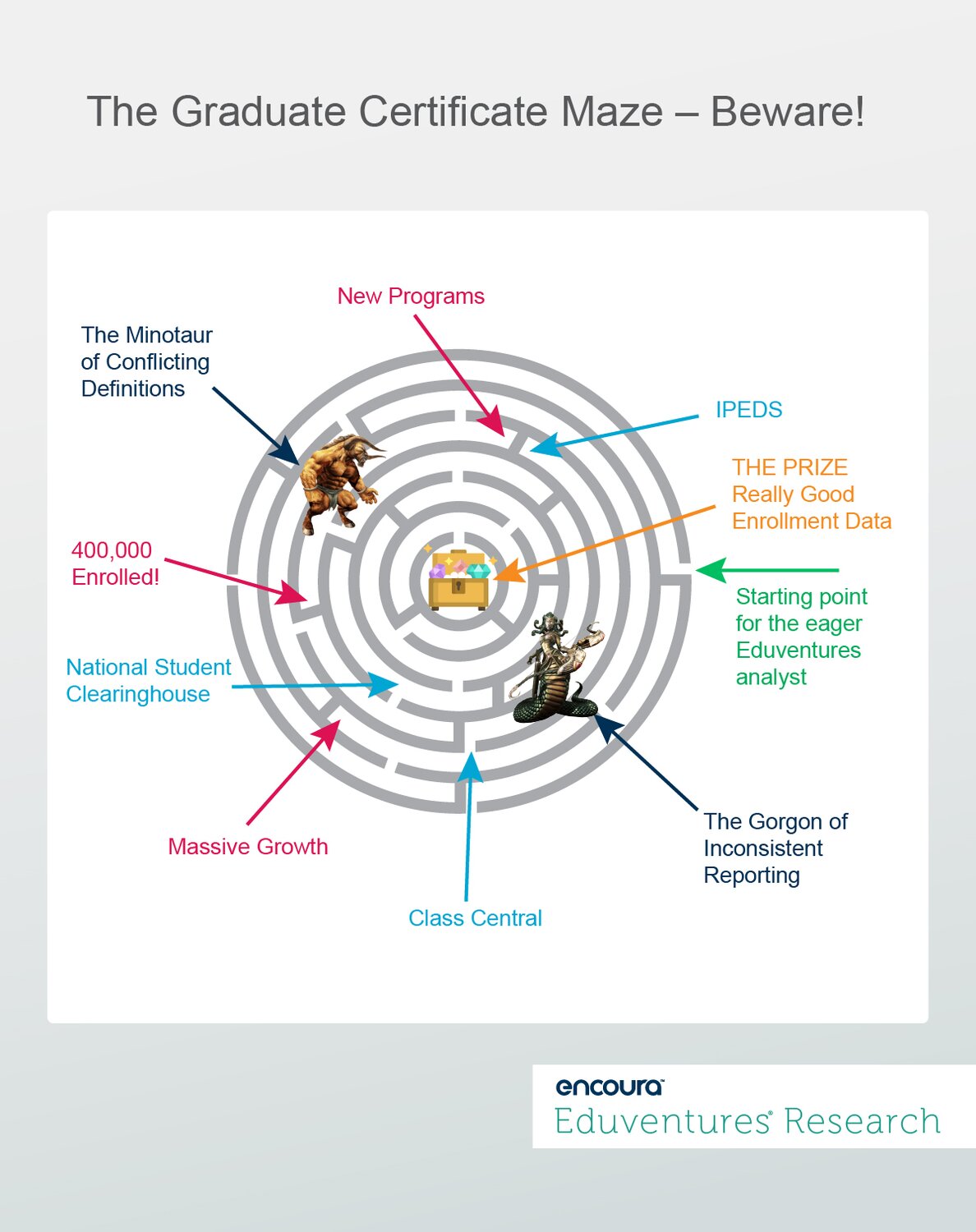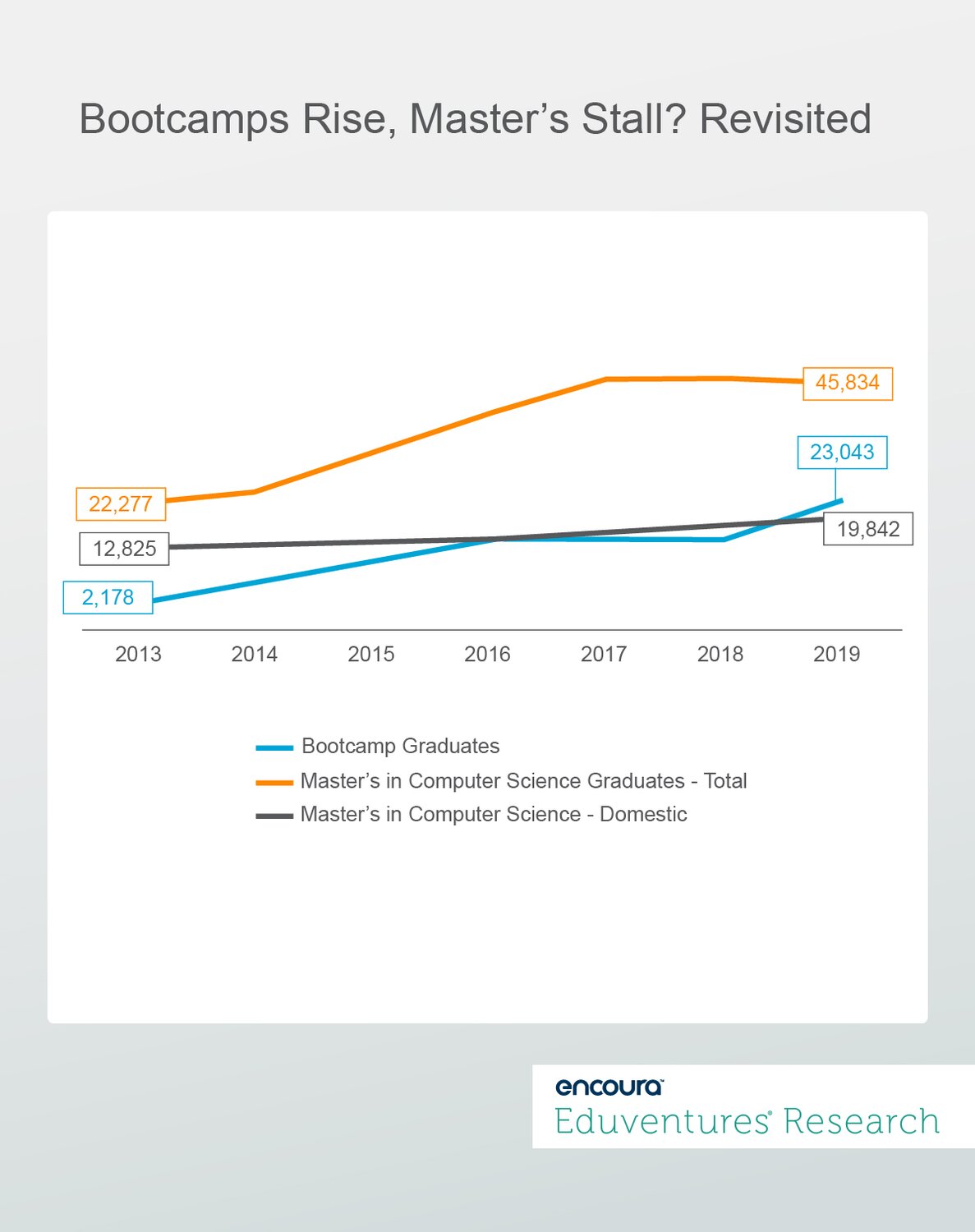COVID-19 has humbled prognosticators everywhere: an impossible-to-predict global pandemic has impacted higher education in 2020 far more than anything this rusty analyst’s musing could conjure in the halcyon days of last January.
A year ago, my first of three annual predictions for 2020—no recession—appears positively quaint amid the roughest economic gyrations since World War II. I based that prediction on past pre-recession adult undergraduate enrollment momentum, something not seen in 2019. But this turned out to be just further evidence that everyone, adult learners included, were looking in the wrong place for signs of economic trouble. For what it’s worth, but for the small matter of COVID-19, adult learners were probably right.
My other two 2020 predictions: 1) that non-degree graduate programs would report continued stellar growth, and 2) that coding bootcamps graduations would surpass domestic computer science master’s degree conferrals, were more on the money.
The Graduate Certificate Maze
I predicted that in 2020, growth graduate certificates—short, non-degree, graduate-level programs that go by many names—would once again far outpace master’s growth. The debate was whether these “certificates,” in their new top-school, MOOC, low-price finery, were a big threat to master’s enrollment or just a noisy sideshow. At the time, according to 2018 IPEDS data (and the most recent year available when I made my prediction), graduate certificate completions had jumped 11% year-over-year to more than 70,000, the most impressive leap in at least a decade, while master’s conferrals managed only 2% growth (topping 827,000).
What has happened since then?
According to IPEDS, Graduate certificate programs grew by 4.5% year-over-year, faster than completion growth, risking a program glut. It should be noted that 2019 completion data largely reflects enrollment in 2018, so trying to align time periods for different data points can be tricky.
Does the latest IPEDS data suggest that graduate certificate momentum was short-lived, or are we once again lost in the maze that is Figure 1?

Last year I emphasized that considerable “graduate certificate” activity is not reported to IPEDS. Providers such as Coursera, edX, Emeritus, and GetSmarter, all of which offer various non-degree programs in partnership with U.S. universities, continue to champion their growth, even if actual enrollment numbers are rare. The latest By the Numbers: MOOCs in 2020 report from Class Central charts plenty of new non-degree programs: 360 new non-degree programs in 2020 from the major MOOC platforms, up from 170 new in 2019.
National Student Clearinghouse (NSC) affords a new angle. Historically, NSC did not break out these credentials, but did so for the first time this year. Preliminary reporting on fall 2020 enrollment found 5% year-over-year enrollment growth for “post baccalaureate certificates” and 4.1% growth for “graduate certificates.” These were the two best performing credentials across the undergraduate-graduate spectrum. Both types of certificate also grew in fall 2019, according to the same report, but not as fast.
NSC does not report absolute enrollment, only growth. IPEDS completion figures suggest over 100,000 graduate non-degree program enrollments in 2018—assuming a conservative non-completion rate—and NSC data supports further growth in 2019 and 2020. The NSC data suggests that short, convenient, low-priced graduate non-degree programs held particular appeal mid-pandemic.
As I discussed in another recent Wake-Up Call, MOOC platforms throw around huge “enrollment” numbers for their non-degree offerings, but it is hard to tease out domestic vs. international, current vs. cumulative, and serious vs. casual. A single Coursera non-degree program claimed over 360,000 students “already enrolled” back in September, dwarfing ostensible IPEDS graduate certificate enrollment for all colleges and universities in the whole country! In early December, the same short program reported 409,426 students “already enrolled”—that’s 14% growth in three months!
In the final analysis, the 2020 data haul, meager though it may be, supports my prediction from a year ago: graduate certificate enrollment growth does indeed appear to still be outpacing the master’s competition. The master’s degree remains firmly in charge in terms of scale.
Meanwhile, the graduate certificate maze remains dangerous for unguarded researchers. We will keep moving forward, sword at the ready!
Coding Bootcamps Offer Mixed Signals for 2020
My third prediction for 2020 was that the latest data (for 2019) would show that coding bootcamp graduates had, for the first time, decisively outnumbered domestic master’s degrees awarded in computer science. Figure 2 confirms it.

Source: Course Report and IPEDS.
“Computer Science” includes all master’s conferrals under the two-digit CIP code “'Computer and Information Sciences and Support Services.” Course Report data shows simple year-over-year growth but notes same-school growth as 37% in 2019. Bootcamp graduates narrowly exceeded the domestic master’s total in 2016 but then lost ground.
As predicted, Figure 2 shows that domestic “Computer Science” master’s graduates, despite growing 12% year-over-year, the fastest rate in a decade, fell behind the U.S. coding bootcamp graduate total: less than 20,000 graduates vs. more than 23,000.
Master’s degrees versus bootcamps is not a zero-sum game. Each services students and meets needs the other does not, but there is also overlap between the two. How much overlap is the key question. Co-existence will help clarify boundary lines, pushing universities to do more to justify the length and price of master’s degrees, in terms of deeper content and superior job outlook, and perhaps convincing bootcamps to double down on entry-level positions with good pay and prospects.
Between 2013 and 2019, computer science master’s programs grew faster (15%) than completions (11%), risking a glut of me-too programs that have neither a master’s nor a bootcamp edge. Average completions per master’s program, however, have improved somewhat in recent years, and the decline in international students—computing conferrals fell 14% between 2017 and 2019—may have persuaded some schools to think twice about another master’s launch.
Bootcamps offered by universities, typically to undergraduates, in partnership with bootcamp providers, are excluded from the data used to compile Figure 2.
What do we know about how bootcamps fared in 2020?
Last December when I wrote my 2020 predictions, I had 2018 completion data from IPEDS and 2019 completion data from Course Report, the publication that tracks bootcamp graduates. We now have 2019 IPEDS data but, curiously, no bootcamp update from Course Report.
Course Report’s 2019 Coding Bootcamp Market Size Study was published August 1, 2019, using a survey of bootcamps to project 2019 graduates. As of early December, no 2020 projection has been issued. Rival reports, such as Career Karma’s State of the Coding Bootcamp Market Report 2020, published back in April, do not offer comparable estimates for 2020.
COVID-19 is the likely cause of Course Report’s delay. In such a volatile environment, asking bootcamp providers to report solid numbers is less realistic: projections will be shakier and leaders more reticent. Like colleges, bootcamps, typically in-person, were forced online as the pandemic hit, scrambling operational assumptions.
There have been some reports (see here and here) of bootcamps cutting staff in 2020, but not many. Bootcamps have likely been swept up in the graduate enrollment surge this fall, highlighted in the out-performance by non-degree programs discussed under my second 2020 prediction. Coding bootcamps are the embodiment of short, hands-on, career-oriented programs, many targeting people with bachelor’s degrees. Indeed, the pandemic has emboldened the very tech firms bootcamps supply with talent.
An alternative scenario is that the cohort-based, full-time bootcamp norm was problematic this year when so many prospective students were juggling remote working, health concerns, and trying to keep their kids’ educations on the rails. Online learning may have increased flexibility, but like so many colleges, bootcamps are caught between making the most of online and doing whatever it takes to get back to campus. The fact that Course Report delayed its market update may be a signal that bootcamps have had a rocky year.
The Bottom Line
To recap, my prediction about coding bootcamp graduates surpassing master’s degree awards in computer science (in 2019) appears to have been vindicated.
My prediction that 2019 would be another banner year for graduate certificate completions sort of happened—graduate certificates once again grew faster than master’s degrees—but at nothing like the rate seen in 2018. Preliminary 2020 enrollment data suggests that the pandemic has boosted graduate certificate fortunes.
We won’t say any more about my prediction of no recession in 2020.
Degree and university alternatives, the focus of two of my 2020 forecasts, remain key fault lines for U.S. higher education, pre-pandemic and today. In my view, the pandemic has further boosted the prospects for “graduate certificates": top branded schools, short, applied content, online convenience, and low price—a strong appeal in normal times, but even more attractive this year. Master’s programs cannot ignore this trend.
Pre-pandemic, short programs of all kinds were a useful way for adults to enhance their skillsets, and signal to employers their willingness to invest in themselves. Mid-pandemic, with so many people weathering reduced hours, furloughs and redundancies, the value of the sort of on-demand lifelong learning that MOOC and other platforms embody only grew.
The bootcamp situation is more ambiguous: like for most colleges, the 2020 online pivot was deeply disruptive for typical bootcamp providers. The “back to normal” scenario for bootcamps looks good— it’s hard to see a surfeit of coders any time soon. But this COVID-year may have been as much negative as positive.
Eduventures will continue to track developments in these dynamic but data-hungry domains. Look out for my 2021 predictions to be published in early January.
Never Miss Your Wake-Up Call
Learn more about our team of expert research analysts here.
Eduventures Chief Research Officer at ACT | NRCCUA
Contact
More in Adult Learner Demand
Never Miss Your Wake-Up Call
Learn more about our team of expert research analysts here.

